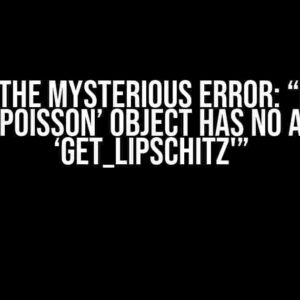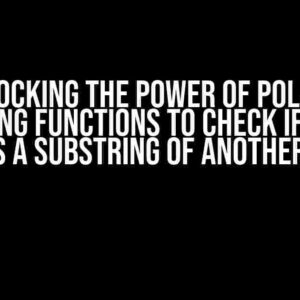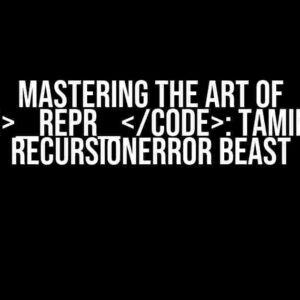Are you tired of encountering the annoying ValueError: JSON string “{" is not valid JSON [closed]” error? Well, you’re not alone! Many developers have fallen victim to this cryptic message, only to spend hours scratching their heads, wondering what went wrong. Fear not, dear reader, for we’re about to embark on a thrilling adventure to demystify this error and provide you with the ultimate solution.
What Does the Error Mean?
The ValueError: JSON string “{" is not valid JSON [closed]” error typically occurs when your Python script attempts to parse a JSON string that’s, well, not quite valid. This can happen due to various reasons, such as:
- Malformed JSON syntax
- Incorrect character encoding
- Truncated or incomplete JSON data
In this article, we’ll delve deeper into each of these scenarios and provide you with practical solutions to overcome them.
Scenario 1: Malformed JSON Syntax
Perhaps the most common cause of this error is a simple typo or incorrect JSON syntax. Let’s consider an example:
import json
json_string = '{"name": "John" "age": 30}'
try:
json.loads(json_string)
except ValueError as e:
print(e)
Run this code, and you’ll get the infamous ValueError: JSON string “{" is not valid JSON [closed]” error. But why? The reason lies in the missing comma between the “name” and “age” key-value pairs.
Corrected code:
import json
json_string = '{"name": "John", "age": 30}'
try:
json.loads(json_string)
except ValueError as e:
print(e)
By adding the missing comma, we’ve fixed the JSON syntax, and the error disappears!
Scenario 2: Incorrect Character Encoding
Another common pitfall is incorrect character encoding. Suppose you’re dealing with a JSON string containing non-ASCII characters:
import json
json_string = '{"name": "René", "age": 30}'
try:
json.loads(json_string.encode('latin-1'))
except ValueError as e:
print(e)
In this example, we’re encoding the JSON string using the Latin-1 character set, which can lead to issues with non-ASCII characters like “é”. To fix this, we need to use the correct encoding:
import json
json_string = '{"name": "René", "age": 30}'
try:
json.loads(json_string.encode('utf-8'))
except ValueError as e:
print(e)
By switching to UTF-8 encoding, we’ve ensured that our JSON string is correctly parsed.
Scenario 3: Truncated or Incomplete JSON Data
Imagine you’re working with a web service that returns JSON data, but occasionally, the response is truncated or incomplete. This can happen due to network issues, server errors, or even malicious activity. Let’s simulate this scenario:
import json
json_string = '{"name": "John", "age":'
try:
json.loads(json_string)
except ValueError as e:
print(e)
As expected, we get the ValueError: JSON string “{" is not valid JSON [closed]” error. To combat this, we can implement a simple workaround:
import json
json_string = '{"name": "John", "age":'
try:
json.loads(json_string)
except ValueError as e:
print("Invalid JSON string. Attempting to repair...")
json_string += '"}'
try:
json.loads(json_string)
except ValueError as e:
print(e)
By appending the missing closing bracket and quote, we’ve effectively “repaired” the truncated JSON string.
Best Practices for Avoiding the Error
To minimize the risk of encountering the ValueError: JSON string “{" is not valid JSON [closed]” error, follow these best practices:
- Validate user input: Ensure that any user-provided JSON data is validated and sanitized before parsing.
- Use a JSON linter: Utilize a JSON linter tool to catch syntax errors and warn you of potential issues.
- Implement error handling: Always wrap your JSON parsing code with try-except blocks to catch and handle exceptions gracefully.
- Test your code: Thoroughly test your code with various input scenarios to uncover potential JSON syntax errors.
Conclusion
The ValueError: JSON string “{" is not valid JSON [closed]” error is a common obstacle that can be overcome with a solid understanding of JSON syntax, character encoding, and error handling techniques. By following the scenarios and best practices outlined in this article, you’ll be well-equipped to tackle this error and ensure your Python scripts parse JSON data with confidence.
| Error Scenario | Solution |
|---|---|
| Malformed JSON syntax | Validate JSON syntax and ensure correct character encoding. |
| Incorrect character encoding | Use the correct character encoding (e.g., UTF-8) for non-ASCII characters. |
| Truncated or incomplete JSON data | Implement error handling and attempt to repair the JSON string. |
Remember, a well-structured JSON string is the key to a harmonious Python development experience. By being mindful of these pitfalls and following best practices, you’ll minimize the risk of encountering the ValueError: JSON string “{" is not valid JSON [closed]” error and ensure your scripts run smoothly and efficiently.
Frequently Asked Question
Got stuck with the infuriating “ValueError: JSON string "{" is not valid json” error? Don’t worry, we’ve got you covered! Here are some frequently asked questions to help you out:
What is the “ValueError: JSON string "{" is not valid json” error, and why does it occur?
This error occurs when you’re trying to parse a JSON string that is not valid JSON. The string “{"” is not a valid JSON object, and the parser is complaining about it. This could be due to a malformed JSON string, or an empty or incomplete JSON object.
How can I fix this error and get my JSON parsing to work?
To fix this error, you need to ensure that the JSON string you’re trying to parse is valid and well-formed. Check that your JSON string has a valid structure, with proper opening and closing brackets, and that all keys and values are properly quoted. You can use online tools like JSONLint to validate your JSON string.
What are some common mistakes that lead to this error?
Some common mistakes that lead to this error include missing or mismatched brackets, incorrect quoting of keys and values, and incomplete or truncated JSON objects. Also, be careful when concatenating strings to form a JSON object, as this can lead to syntax errors.
Can I use the `json.loads()` function with a default value to avoid this error?
Yes, you can use the `json.loads()` function with a default value to avoid this error. For example, you can use a try-except block to catch the `ValueError` exception and return a default value instead. This can be useful when you’re working with uncertain or dynamic data.
Are there any alternative JSON parsing libraries that can handle malformed JSON strings?
Yes, there are alternative JSON parsing libraries that can handle malformed JSON strings, such as the `ujson` library. These libraries often have more relaxed parsing rules and can tolerate certain types of syntax errors. However, be careful when using these libraries, as they may not always produce the expected results.

![ValueError: JSON String “{" is not Valid JSON [Closed]: Unraveling the Mystery ValueError: JSON String “{" is not Valid JSON [Closed]: Unraveling the Mystery](https://freedman.hkhazo.biz.id/wp-content/uploads/sites/865/2024/07/valueerror-json-string-is-not-valid-json-closed-unraveling-the-mystery-with-text.jpg)


